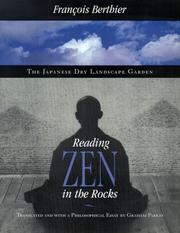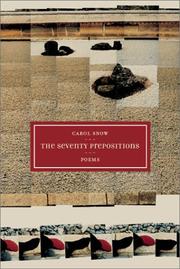| Listing 1 - 5 of 5 |
Sort by
|

ISBN: 0226044114 Year: 2000 Publisher: Chicago, Ill. : University of Chicago Press,
Abstract | Keywords | Export | Availability | Bookmark
 Loading...
Loading...Choose an application
- Reference Manager
- EndNote
- RefWorks (Direct export to RefWorks)
Rock gardens --- Rock gardens, Japanese --- Zen influences. --- Ryōanji Teien (Kyoto, Japan).
Book
ISBN: 9780226947655 0226947653 Year: 2009 Publisher: Chicago ; London University of Chicago Press
Abstract | Keywords | Export | Availability | Bookmark
 Loading...
Loading...Choose an application
- Reference Manager
- EndNote
- RefWorks (Direct export to RefWorks)
Zen Buddhism --- Civilization, Western --- Archery --- Rock gardens, Japanese. --- Gardens --- Study and teaching --- Japanese influences. --- Religious aspects. --- Herrigel, Eugen, --- Ryōanji Teien (Kyoto, Japan)

ISBN: 0520937694 9780520937697 0520240774 9780520240773 0520240812 9780520240810 Year: 2004 Publisher: Berkeley University of California Press
Abstract | Keywords | Export | Availability | Bookmark
 Loading...
Loading...Choose an application
- Reference Manager
- EndNote
- RefWorks (Direct export to RefWorks)
Carol Snow's award-winning poetry has been admired and celebrated as "work of difficult beauty" (Robert Hass), "ever restless, ever re-framing the frame of reference" (Boston Review), teaching us "how brutally self-transforming a verbal action can be when undertaken in good faith" (Jorie Graham). In this, her third volume, Snow continues to mine the language to its most mysterious depths and to explore the possibilities its meanings and mechanics hold for definition, transformation, and emotional truth. These poems place us before, and in, language--as we stand before, and in, the world. The Seventy Prepositions comprises three suites of poems. The first, "Vocabulary Sentences," reflects on words and reality by taking as a formal motif the sort of sentences used to test vocabulary skills in elementary school. The poems of the second suite, "Vantage," gather loosely around questions of perspective and perception. The closing suite finds its inspiration in the Japanese dry-landscape gardens known as karesansui, such as the famous rock garden at Ryoan-ji Temple in Kyoto. Here the poet approaches composition as one faces a "miniature Zen garden," choosing and positioning words rather than stones, formally, precisely, evocatively.
Rock gardens, Japanese --- Japanese rock gardens --- Japanese stone gardens --- Stone gardens, Japanese --- Ryōanji (Kyoto, Japan) --- Kyoto (Japan). --- 竜安寺 (Kyoto, Japan) --- 龍安寺 (Kyoto, Japan) --- american poets. --- award winning poetry. --- beauty. --- book club reads. --- change in perspective. --- contemporary poetry. --- definitions. --- emotional truth. --- formal. --- human perception. --- japanese gardens. --- karesansui. --- kyoto. --- linguistics. --- lit students. --- literary critics. --- meaning making. --- mechanics of poetry. --- modern poetry. --- poems. --- poetry collection. --- poetry. --- power of language. --- precise language. --- rock gardens. --- ryoan ji temple. --- transformation. --- verbal actions. --- vocabulary. --- words and language. --- zen garden.
Book
ISBN: 022678424X 9780226784243 Year: 2011 Publisher: Chicago
Abstract | Keywords | Export | Availability | Bookmark
 Loading...
Loading...Choose an application
- Reference Manager
- EndNote
- RefWorks (Direct export to RefWorks)
In the years after World War II, Westerners and Japanese alike elevated Zen to the quintessence of spirituality in Japan. Pursuing the sources of Zen as a Japanese ideal, Shoji Yamada uncovers the surprising role of two cultural touchstones: Eugen Herrigel’s Zen in the Art of Archery and the Ryoanji dry-landscape rock garden. Yamada shows how both became facile conduits for exporting and importing Japanese culture. First published in German in 1948 and translated into Japanese in 1956, Herrigel’s book popularized ideas of Zen both in the West and in Japan. Yamada traces the prewar history of Japanese archery, reveals how Herrigel mistakenly came to understand it as a traditional practice, and explains why the Japanese themselves embraced his interpretation as spiritual discipline. Turning to Ryoanji, Yamada argues that this epitome of Zen in fact bears little relation to Buddhism and is best understood in relation to Chinese myth. For much of its modern history, Ryoanji was a weedy, neglected plot; only after its allegorical role in a 1949 Ozu film was it popularly linked to Zen. Westerners have had a part in redefining Ryoanji, but as in the case of archery, Yamada’s interest is primarily in how the Japanese themselves have invested this cultural site with new value through a spurious association with Zen.
Archery --- Civilization, Western --- Zen Buddhism --- Rock gardens, Japanese --- Religious aspects. --- Japanese influences. --- Study and teaching --- Herrigel, Eugen, --- Ryōanji Teien (Kyoto, Japan) --- japan, zen, philosophy, religion, spirituality, eugen herrigel, ryoanji, rock garden, archery, tradition, spiritual discipline, buddhism, myth, folk belief, focus, meditation, breathing, release, purposelessness, purposefulness, shooting, war, beauty, reflection, olympics, muro saisei, shiga naoya, nonfiction, eastern, western, advertising, self-help, martial arts, yoga, cultural appropriation, popular culture, history.
Book
ISBN: 9780226947648 0226947645 Year: 2009 Publisher: Chicago The university of Chicago press
Abstract | Keywords | Export | Availability | Bookmark
 Loading...
Loading...Choose an application
- Reference Manager
- EndNote
- RefWorks (Direct export to RefWorks)
Archery --- Civilization, Western --- Rock gardens, Japanese --- Zen Buddhism --- Religious aspects. --- Japanese influences. --- Study and teaching --- Herrigel, Eugen, --- Ryōanji Teien (Kyoto, Japan). --- J1880 --- J4129 --- J6977 --- Martial arts --- Shooting --- Bow and arrow --- Chʻan Buddhism --- Dhyāna (Sect) --- Zen --- Zen (Sect) --- Buddhism --- Mahayana Buddhism --- Japanese rock gardens --- Japanese stone gardens --- Stone gardens, Japanese --- Civilization, Occidental --- Occidental civilization --- Western civilization --- Religious aspects --- Japanese influences --- Japan: Religion -- Buddhism -- Zen --- Japan: Sociology and anthropology -- cross-cultural contacts, contrasts and globalization --- Japan: Sports and recreation -- martial arts, fighting sports -- archery, kyūdō --- Herrigel, Eugen --- Bungaku Hakushi --- Ryōanji Teien (Kyoto, Japan) --- Ryūanji Teien (Kyoto, Japan) --- Toranoko watashi (Kyoto, Japan) --- Toranoko watashi no niwa (Kyoto, Japan) --- ヘリゲル, オイゲン
| Listing 1 - 5 of 5 |
Sort by
|

 Search
Search Feedback
Feedback About UniCat
About UniCat  Help
Help News
News